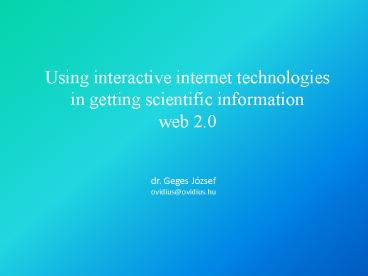Using interactive internet technologies in getting scientific information web 2'0 - PowerPoint PPT Presentation
1 / 38
Title:
Using interactive internet technologies in getting scientific information web 2'0
Description:
Because it is free. Web based, fast and sophisticated platform. Encyclopaedia of Human Knowledge ... than iPods became able to synchronize with podcast feeds, ... – PowerPoint PPT presentation
Number of Views:93
Avg rating:3.0/5.0
Title: Using interactive internet technologies in getting scientific information web 2'0
1
Using interactive internet technologies in
getting scientific informationweb 2.0
- dr. Geges József
- ovidius_at_ovidius.hu
2
Why important
- Scientific Library should have interactive
services, because roles of library continuously
change - form of information also change
- more and more pictures, voices, videos and other
multimedia sources are found even if we cannot
find them by one step searching - we should take our share in making the choice
wider - it is high time to learn the technologies at
least and how to use them
3
MOKSZ Informatio Medicata, Budapest 2008.
szeptember 24-27.
4
What this presentation about
- RSS (Really Simple Syndication)
- Wiki based services
- Blog private, institutional and library
- Podcast the more voice the
- more professionalism
- Mailing and discussion lists
- How to share knowledge
5
RSS
- Most library patrons needs personalised services
(David Walker California State University
Library) - Efficiency of library services needs improvement
- One of the solutions is RSS
- RSS is widely used by the biggest information
sources. - Within short period fo time RSS will shift the
presently used mailing alert services - We should know what we can expect from this
technology
6
RSS in the library
- Simplicity, simplicity, simplicity Henry
David Thoreau - Everything should be simple but not most
simpliest Albert Einstein - It is very hard to reach simplicity! - Jonathan
Ive Apple iPod constructor - Updates simple and fast (John Law ProQuest)
- No redundancy, no duplication, no confusion
- Really user-friendly approach
7
Databases with RSS subscriptions
- Much better usage statistics
- Increase the prestigious of the library and makes
it more discoverable - More simple administration
- Cutting the time for researchers
8
(No Transcript)
9
(No Transcript)
10
(No Transcript)
11
(No Transcript)
12
(No Transcript)
13
Wiki
- What is Wiki?
- Community edited services with special retreival
software - Community kills contents
- Because it is free
- Web based, fast and sophisticated platform
- Encyclopaedia of Human Knowledge
- as AskDrWiki, Ganfynd, Citizendium
- Well working information sharing
- Different kind of media within one keywords
- Fast growing, transparent but not suits to be
cited
14
(No Transcript)
15
(No Transcript)
16
(No Transcript)
17
(No Transcript)
18
(No Transcript)
19
(No Transcript)
20
(No Transcript)
21
(No Transcript)
22
Library BLOGs
- Open accessed or hidden sites for sharing
information between blogger and readers - Highly interactive
- Well dated discussion interface
- It is a pity theree is no any filtering
- Community keep control over contents
- Collects huge number of opinion
- Keep library in live
- Simply administration
- Very good statistics
23
(No Transcript)
24
(No Transcript)
25
(No Transcript)
26
(No Transcript)
27
(No Transcript)
28
(No Transcript)
29
(No Transcript)
30
Podcast
- What is podcast?
- A podcast is a series of audio or video
digital-media files which is distributed over the
Internet by syndicated download, through Web
feeds, to portable media players and personal
computers. Though the same content may also be
made available by direct download or streaming, a
podcast is distinguished from other digital-media
formats by its ability to be syndicated,
subscribed to, and downloaded automatically when
new content is added. - Like the term broadcast, podcast can refer either
to the series of content itself or to the method
by which it is syndicated the latter is also
called podcasting. The host or author of a
podcast is often called a podcaster. One of the
first broadcasts was sent out by a small radio
station in Surrey by radio DJ Kelly Coulter. - The term is a portmanteau of the words "iPod" and
"broadcast",1 the Apple iPod being the brand of
portable media player for which the first
podcasting scripts were developed (see history of
podcasting). Such scripts allow podcasts to be
automatically transferred from a personal
computer to a mobile device after they are
downloaded.2 As more devices other than iPods
became able to synchronize with podcast feeds,
the term was redefined by some parties as a
backronym for "Personal On Demand
broadCASTING".345
31
(No Transcript)
32
(No Transcript)
33
(No Transcript)
34
(No Transcript)
35
(No Transcript)
36
(No Transcript)
37
Mailing lists
38
Knowledge and presentation management interface































